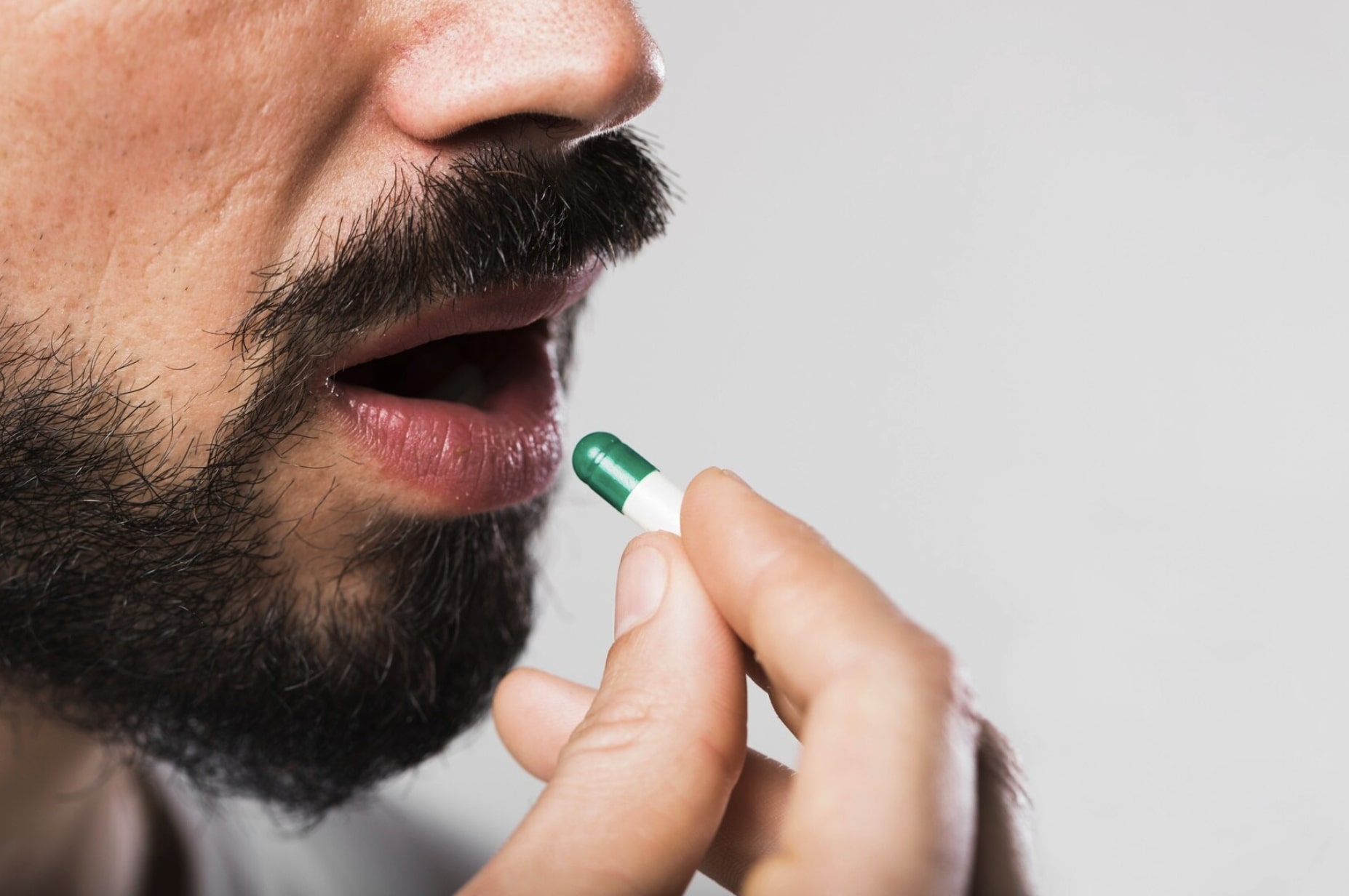When most men think about low testosterone, they tend to think of aging first and foremost. But while it's true that testosterone levels tend to decline gradually over time, age isn't the only factor at play. If you’ve been feeling more fatigued, less focused, noticing a dip in your libido or are experiencing issues with erectile dysfunction, the issue might actually be starting in your gut.Your gut is much more than just a digestive organ. It also plays a critical role in regulating many systems throughout the body, including your hormones. Specifically, the trillions of bacteria in your gut microbiome may play a critical role in determining how much testosterone your body produces, and how efficiently it uses it, which can drastically affect how you feel on a day-to-day basis. In this article, we’ll break down the gut-testosterone connection, explore how gut health affects hormone levels, and share practical steps to naturally optimize both your gut and testosterone.
What Is the Gut Microbiome and Why It Matters
Your gut is home to trillions of microorganisms such as bacteria, viruses, and fungi collectively known as the gut microbiome. This diverse ecosystem has a massive impact on your overall health, influencing everything from digestion to immune function to brain chemistry.So how does it relate to testosterone?A balanced gut microbiome supports hormone production by improving nutrient absorption, reducing inflammation, and keeping stress levels in check. When your gut bacteria are thriving, your body is better equipped to:
- Absorb key nutrients like zinc, magnesium, and vitamin D (all vital for testosterone production)
- Signal hormone release through the brain-gut axis
- Regulate inflammation and stress hormones like cortisol, which can suppress testosterone
On the flip side, an imbalanced gut—also called dysbiosis—can throw everything off. Dysbiosis in the gut can make you more susceptible to bacterial infections, inflammatory bowel diseases, and digestive difficulties. It can also impact brain function through your immune, nervous, and endocrine systems. (1)
How Gut Health Affects Testosterone Levels
The gut and testosterone are connected through a complex web of biochemical processes. Here’s a closer look at how poor gut health can sabotage your T levels:
Chronic Inflammation Disrupts Testosterone Production
When your gut lining becomes compromised—a condition often called “leaky gut” or increased intestinal permeability—toxins and undigested food particles can enter the bloodstream, triggering chronic inflammation. Inflammation signals your body to produce more cortisol, a stress hormone that directly inhibits testosterone production. Over time, this chronic inflammatory response doesn’t just reduce testosterone—it also disrupts the delicate balance of other hormones like insulin and thyroid hormones, compounding fatigue, weight gain, and brain fog. Leaky gut is also thought to be a contributing factor to conditions such as autoimmune disorders, food sensitivities, irritable bowel syndrome (IBS), chronic fatigue, and even mental health challenges like anxiety and depression. (2)
Gut Bacteria Help Manage Cholesterol
Your body uses cholesterol as the raw material to create testosterone. Healthy gut bacteria assist in metabolizing cholesterol efficiently, helping maintain the right balance needed for hormone synthesis. Without this process, your body may struggle to produce enough testosterone—even if you’re eating clean and staying disciplined.Some gut microbes also help regulate bile acids, which play a key role in breaking down dietary fats. If your microbiome is imbalanced, you may not be efficiently converting fats into usable cholesterol substrates—leaving your endocrine system short on the materials it needs to support optimal testosterone output.
Nutrient Absorption Suffers in Dysbiosis
Low levels of testosterone are often linked to deficiencies in zinc, magnesium, and vitamin D. If your gut can’t properly absorb these nutrients due to an unhealthy microbiome, your hormonal health will take a hit—regardless of how many supplements you take.Dysbiosis may also impair the synthesis of certain B vitamins, which are crucial for energy metabolism and hormone regulation. (3) So while you may be eating “healthy,” your body could be operating at a nutrient deficit if your gut isn’t up to the task of absorbing and converting what you consume.
Signs of Gut-Related Hormone Imbalance
While gut-related testosterone issues are a serious problem for men, it’s not always easy to know for sure if your low T is caused by a hormonal imbalance. While lab testing is needed for a complete picture, there are some common symptoms to look out for that may suggest your gut might be impacting your hormones, such as:
- Digestive issues like bloating, constipation, gas, or irregular bowel movements
- Fatigue that doesn’t improve with rest, low libido, or poor workout recovery
- Mood swings, brain fog, or difficulty concentrating
- Chronic inflammation, frequent colds, or emerging food sensitivities
If any of these symptoms sound familiar, your gut health deserves a closer look. Gameday’s testosterone services include advanced testing and personalized treatment plans to help you get to the root of the problem, not just temporarily treat the symptoms.
How to Support Gut Health and Testosterone Naturally
The good news is your gut is highly responsive to lifestyle changes. Supporting your microbiome can also improve testosterone naturally over time. Start with these proven strategies:
- Eat a diverse, fiber-rich diet. Focus on vegetables, whole grains, legumes, and plant-based variety to feed beneficial bacteria. Current dietary guidelines suggest that adults get 14 grams of fiber for every 1,000 calories consumed. (4)
- Include fermented foods, and add yogurt, kefir, kimchi, miso, or sauerkraut to your meals to boost probiotic intake.
- Limit processed sugars and alcohol. Both feed harmful bacteria and have been shown to be a key factor in the occurrence and aggravation of inflammation. (5)
- Consider probiotics and prebiotics. A high-quality supplement may help restore balance—especially if you’ve used antibiotics recently.
- Manage stress and prioritize sleep. Chronic stress and poor sleep raise cortisol levels, directly reducing testosterone.
Want to know what changes are best for your body? Schedule a wellness consultation at Gameday Men’s Health and get a personalized approach that supports your lifestyle, gut microbiome, and hormones.
When Lifestyle Isn’t Enough: Why Testosterone Testing Matters
Even with a clean diet and disciplined routine, some men still find their testosterone levels remain low. That’s because factors like genetics, long-term stress, past infections, or environmental toxins can continue to disrupt your hormone balance despite your best efforts. Some studies have shown that nearly 40% of American men over 45 are suffering from hypogonadism (low testosterone). (6)That’s why regular testosterone testing is a smart move—especially for men over 40 who suspect something feels off.At Gameday Men’s Health, we provide fast, accurate hormone testing and clear explanations of your results—so you know exactly where you stand. If your testosterone is low, we work with you to find a treatment plan that fits your needs, whether that includes lifestyle coaching, nutritional changes, or medical testosterone replacement therapy (TRT).Knowing your numbers is the first step toward feeling like yourself again.
Why Gameday Men’s Health Focuses on the Whole Picture
At Gameday Men’s Health, we don’t just hand you a prescription and send you on your way. We believe in holistic treatment that manages the entire problem, not just the symptoms. When it comes to issues with gut health and testosterone, that means taking the time to understand:
- What’s causing your low T—gut health, sleep habits, stress levels, or all of the above.
- How your body responds to hormone therapy and adjusting accordingly.
- What your personal goals are, whether that’s building muscle, improving mood, or boosting energy.
Our custom TRT programs are designed to work with your body’s natural rhythms. We create safe, effective plans tailored to your biochemistry, and we’re with you every step of the way—offering expert support in a non-judgmental environment that’s created for men.
The Gut-Testosterone Connection: Heal the Gut, Support Your Hormones
Your gut might be the key to unlocking better testosterone levels, improved energy, and sharper mental clarity. While aging does play a role in hormonal shifts, your gut health is something you can influence starting today.From reducing inflammation to improving nutrient absorption and lowering stress, supporting your microbiome is one of the smartest strategies for long-term hormonal health.Don’t wait until fatigue and frustration become your new normal. Take control of your internal health. If you suspect you have low testosterone—or just want to better manage your energy and performance—our team is here to help you feel like your best self again. Ready to take control of your gut and hormones? Schedule your consultation with Gameday Men’s Health and start feeling like yourself again.References











